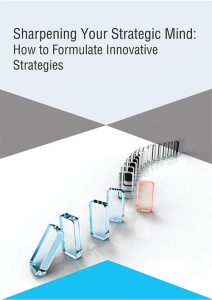Sharpening Your Strategic Mind
How to Formulate Innovative Strategies
The ability to develop operational business strategies of the highest calibre and execute them sets true leaders apart from their peers. Innovative strategy formulation can make the difference between a profitable organisation and one that falls below quality standards.
This three-day interactive learning program will help leaders build a roadmap for their team, department or organisation, so they formulate the steps of how to get where the organisation wants to be. It takes the leaders right through the strategic planning process with helpful tools, techniques and ideas for every stage to enhance their strategic thinking skills.
The goal of this learning program is to equip leaders with a range of new techniques that will help them to:
-
- Understand and implement strategic thinking
-
- Explore key elements that enable a strategy to be successful.
-
- Improve or create business models for value creation.
-
- Produce an effective strategic plan that is aligned with their organisation’s vision and purpose.
-
- Enhance the decision-making process by highlighting and expanding on strengths and re-building weaknesses.
-
- Link strategy and innovation to achieve growth.
-
- Use strategy to gain a competitive advantagel.
-
- Understand the major downfalls that great organisations have encountered and what the necessary steps were to avoid such blunders.
-
- Understand the financial structures, processes and procedures needed for strategy implementation.
-
- Set long and short-term goals for their orgainsation
DELIVERY STYLE
This is an interactive program on Strategic Planning. Participants will learn through a variety of methods including:
- • Group discussions – 25%
- • Role plays and simulating real situations – 15%
- • One-on-one coaching – 5%
- • Written exercises in which you will apply key concepts – 20%
- • Question and answer sessions (Anytime)
- • Examples and case studies – 20%.
- • Theory and its practical application – 15%
Program Overview in PDF
TARGET AUDIENCE
All members of an Organization.


